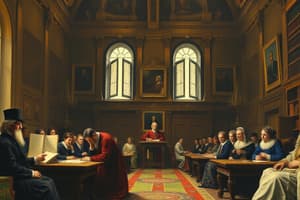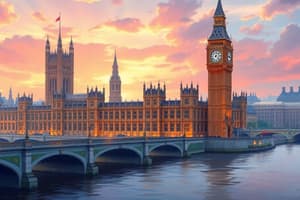Podcast
Questions and Answers
What is the primary legislative power of the House of Commons?
What is the primary legislative power of the House of Commons?
- The ability to extend its own life beyond five years
- The ability to veto any bill
- The ability to propose amendments to the government
- The ability to authorize taxation and budget laws (correct)
What was a significant effect of the Parliament Act of 1911?
What was a significant effect of the Parliament Act of 1911?
- It allowed money bills to bypass the House of Lords. (correct)
- It expanded the veto power of the Lords.
- It abolished the House of Lords entirely.
- It limited the House of Commons' law-making abilities.
How did the introduction of life peers in 1958 affect the House of Lords?
How did the introduction of life peers in 1958 affect the House of Lords?
- It allowed them to propose unlimited amendments.
- It decreased their ability to delay bills. (correct)
- It strengthened the power of the Lords.
- It made them the primary legislative body.
What restriction exists on the House of Lords regarding the Commons' extension of life?
What restriction exists on the House of Lords regarding the Commons' extension of life?
What informal rule does the House of Lords follow regarding bills proposed by the government party?
What informal rule does the House of Lords follow regarding bills proposed by the government party?
What is the current status of the House of Commons in terms of legislative power?
What is the current status of the House of Commons in terms of legislative power?
What is one role of the House of Lords?
What is one role of the House of Lords?
What was a major change following the Reform Acts in the 19th century?
What was a major change following the Reform Acts in the 19th century?
Flashcards
Power of the House of Commons
Power of the House of Commons
The House of Commons is the more powerful legislative body in the UK, having the ability to pass any law with little restriction.
Commons' Control over Laws
Commons' Control over Laws
Since the Bill of Rights, the House of Commons has the authority to control laws of taxation and budgeting.
Reform Acts and Commons' Power
Reform Acts and Commons' Power
The Commons gained more influence in the 19th century due to the Reform Acts, which extended voting rights, giving greater representation to the population.
House of Lords: Limited Power
House of Lords: Limited Power
Signup and view all the flashcards
Parliament Act and Money Bills
Parliament Act and Money Bills
Signup and view all the flashcards
Lords' Limited Power
Lords' Limited Power
Signup and view all the flashcards
Life Peers and Lords' Power
Life Peers and Lords' Power
Signup and view all the flashcards
Unwritten Constitution and Commons' Power
Unwritten Constitution and Commons' Power
Signup and view all the flashcards
Study Notes
Power Dynamics in the British Parliament
- House of Commons is the more powerful chamber, despite its name.
- The Bill of Rights established Parliament's supreme authority, granting the Commons crucial power.
- The Commons controls taxation and the budget.
- The Commons represents the tax-paying majority.
- The 19th-century Reform Acts increased the Commons' influence as elected MPs represented a larger segment of the population.
- However, the House of Lords retained the power to veto bills.
- This power was frequently used, especially against liberal reforms, due to the Lords' conservative, aristocratic composition.
- The 1911 Parliament Act resolved the conflict, limiting the Lords' power.
- Money bills and bills authorizing government spending can bypass the House of Lords.
- Other bills must be approved by both houses; the Lords can delay but can be overridden in subsequent sessions.
- The Lords' power is reduced to delaying bills, except for extending the Commons' term beyond its legal maximum.
Evolution of Power Balance
- The introduction of life peers in 1958 further diminished the Lords' power.
- Most of these peers were known politicians or public servants, showing deference to the Commons' authority.
- Currently, the House of Commons is the supreme legislative body.
- The Commons lacks a formal constitutional limit, meaning they hold unrestricted power to enact any law change.
- The monarch's role is essentially to confirm the laws, which they usually adhere to.
Role of the House of Lords
- The Lords rarely exercise their veto power, avoiding direct conflict.
- There's an unwritten rule where Lords avoid voting against bills championed by the party in power.
- The Lords' primary function is to critique government actions, flag potential issues with bills, and voice public concerns.
- These criticisms are made by proposing amendments and even initiating bills of their own; though few are adopted by the Commons.
Studying That Suits You
Use AI to generate personalized quizzes and flashcards to suit your learning preferences.




